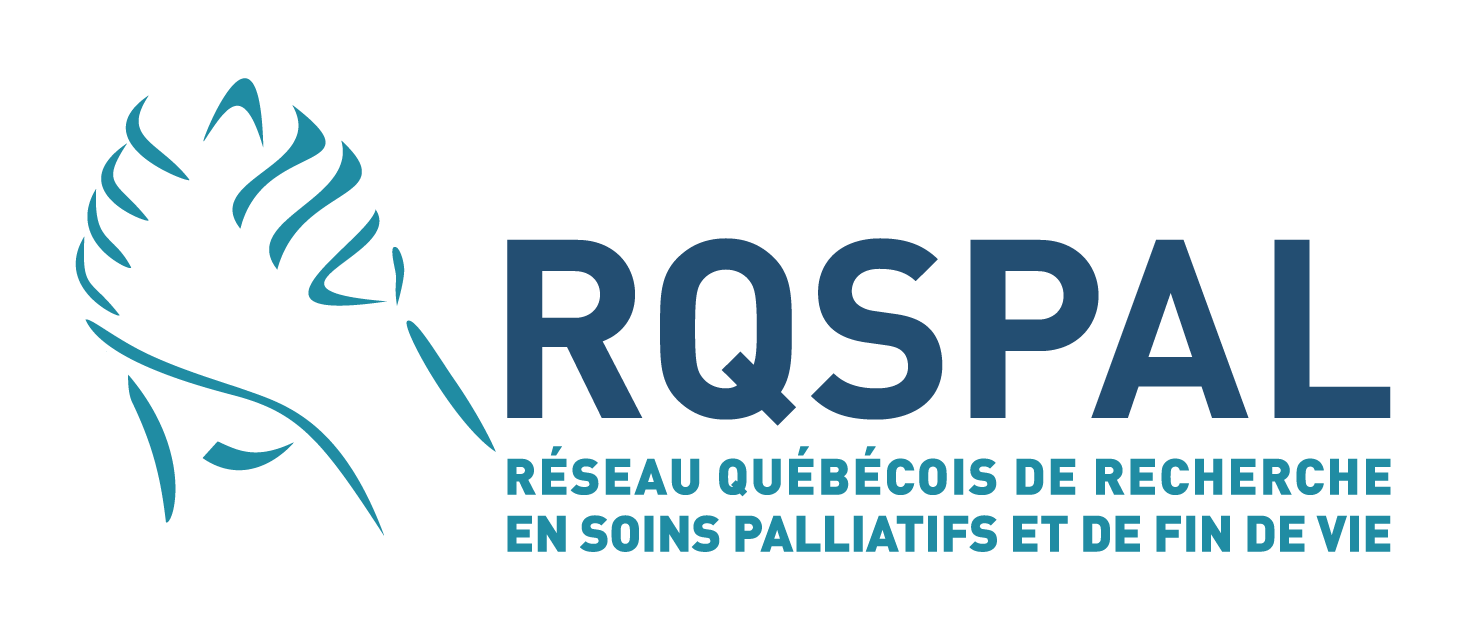The strategic research programming addresses the main challenges related to palliative and end-of-life care, namely quality, continuity, equity, and accessibility of these services. It includes all client populations, without restriction regarding age or diagnosis.
We subscribe to the new definition of palliative care resulting from a consensus of the International Association for Hospice and Palliative Care (IAHPC; Radbruch et al. 2020*): “Palliative care is the active holistic care of individuals across all ages with serious health-related sufferingi due to severe illnessii, and especially of those near the end of life. It aims to improve the quality of life of patients, their families and their caregivers.
Palliative care:
- Includes, prevention, early identification, comprehensive assessment and management of physical issues, including pain and other distressing symptoms, psychological distress, spiritual distress and social needs. Whenever possible, these interventions must be evidence based.
- Provides support to help patients live as fully as possible until death by facilitating effective communication, helping them and their families determine goals of care.
- Is applicable throughout the course of an illness, according to the patient’s needs.
- Is provided in conjunction with disease modifying therapies whenever needed.
- May positively influence the course of illness.
- Intends neither to hasten nor postpone death, affirms life, and recognizes dying as a natural process.
- Provides support to the family and the caregivers during the patient’s illness, and in their own bereavement.
- Is delivered recognizing and respecting the cultural values and beliefs of the patient and the family.
- Is applicable throughout all health care settings (place of residence and institutions) and in all levels (primary to tertiary).
- Can be provided by professionals with basic palliative care training.
- Requires specialist palliative care with a multiprofessional team for referral of complex cases.”
Definitions
Additionally, we adhere to the definitions set forth in the “Act Respecting End-of-Life Care“:
-
Palliative care: “the total and active care delivered by an interdisciplinary team to patients suffering from a disease with reserved prognosis, in order to relieve their suffering, without delaying or hastening death, maintain the best quality of life possible and provide them and their close relations the support they need”;
-
End-of-life care: “palliative care provided to end-of-life patients and medical aid in dying”;
-
Continuous palliative sedation: “care that is offered as part of palliative care and consists in administering medications or substances to an end-of-life patient to relieve their suffering by rendering them unconscious without interruption until death ensues”;
-
Medical aid in dying: “care consisting in the administration by a competent professional of medications or substances to a patient, at the patient’s request, in order to relieve their suffering by hastening death”.
Thus, our research activities support the provision of care and services in the health and social services network, community organizations, and palliative care homes.
By clicking here, you will find an overview (in french) of palliative and end-of-life care research in Quebec within the RQSPAL (2022). It provides an overview of the research we conducted in 2021 with 59 of our researchers who are regular members of the RQSPAL. If you are a researcher interested in the field of PEOLC and would like to join the RQSPAL, we warmly invite you to contact the executive director: François Tardif at francois.tardif@crchudequebec.ulaval.ca
*Radbruch L et al. (2020). Redefining palliative care—a new consensus-based definition. Journal of pain and symptom management, 60(4) : 754-764.
i Suffering is health-related when it is associated with illness or injury of any kind. Health related suffering is serious when it cannot be relieved without professional intervention and when it compromises physical, social, spiritual and/or emotional functioning. Available in http://pallipedia.org/serious-health-related-suffering-shs/
ii Severe illness is any acute or chronic illness and/or health condition that carries a high risk of mortality, negatively impacts quality of life and daily function, and/or is burdensome in symptoms, treatments, or caregiver stress. Available at https://pallipedia.org/severe-illness/
Research axes
The research programming of the RQSPAL is organized into four axes:
Axis 1 | Interdisciplinary Support for Vulnerable Individuals, their Quality of Life, their Suffering, their Loved Ones, and Involved Caregivers
This axis focuses on the support trajectories of the quality of life of vulnerable individuals, from diagnosis to end of life, as well as those of their loved ones, including support for post-death mourning. The objective is to promote innovative initiatives to improve the overall quality of life of individuals requiring palliative care and their loved ones by relieving their pain and suffering, including existential suffering. Furthermore, the axis aims to recognize the complexity of grief in the palliative context and more generally in society. The expected outcomes of this research axis are to contribute to better symptom management and overall improvement of the quality of life of vulnerable individuals and their loved ones, while increasing knowledge about suffering, pain, and quality of life in different contexts of care related to palliative care, end of life, medical aid in dying, and grief.
Axis 2 | Developing a Palliative Approach for Children and their Network from the Prenatal Period to Adulthood
This axis aims to promote the development, access, and quality of palliative and end-of-life care adapted to the clientele in perinatology and pediatrics. This research axis considers the entire trajectory, from the prenatal period to the transition to adulthood, including all conditions or diseases potentially life-threatening to a baby, child, or adolescent, including orphan and genetic diseases. The expected outcomes include the mobilization of various actors involved in palliative and pediatric care (PPC) in an interdisciplinary co-creation process, as well as the mobilization of knowledge in user environments and citizens to improve adapted practices for this population and the training of those involved.
Axis 3 | Towards an Inclusive and Culturally Sensitive Palliative Approach: Universal Access and Equity
This axis aims to promote universal access to palliative and end-of-life care (PEOLC) while aiming for equity in these services. The main objective of this research axis is to prevent injustices in the healthcare system by adapting the traditional model of PEOLC to different contexts and populations. Equity is addressed from several angles, including care and living environments, care trajectories, geographic location, socio-demographic characteristics, and social determinants. The expected outcomes are to propose and implement strategies to reduce or eliminate inequalities and improve research practices of RQSPAL members in terms of equity, diversity, and inclusion.
Axis 4 | Embracing Community and Social Innovation in Integrated Palliative Approach
This axis emphasizes the importance of the community in phenomena associated with dying, death, and grief, through a collaborative interdisciplinary approach of actors contributing to the integration of the palliative approach on the periphery of the health and social services network. By anchoring in the community experience of life phenomena, Axis 4 also focuses on raising awareness among the population, continuity of care and services between institutional and community settings, and regional realities. The flagship project will be the creation of a Living Lab on awareness of dying and death. Axis 4 aims to promote citizen engagement and alignment between the needs of the population and research results. By recognizing the place of the community in palliative care, Axis 4 will contribute to social changes and innovations based on the needs and realities of the field, in a vision of sustainable health and health promotion.

